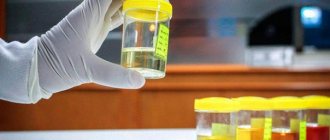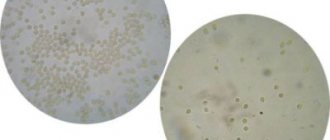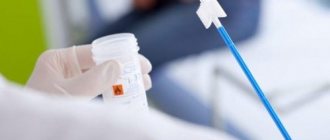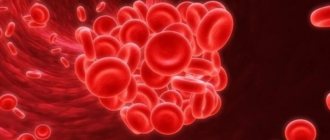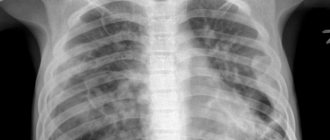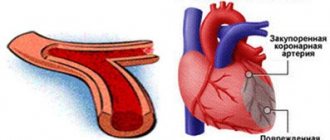Olga Alexandrova, a therapist of the highest category, answers :
— The test results allow not only to diagnose existing diseases and changes in the body, but also to prevent them. Despite the eloquence of many laboratory indicators, only a doctor can make a diagnosis, since changes in some indicators may occur not against the background of pathological processes, but due to the influence of external factors, for example, taking certain medications or intense physical activity.
Article on the topic Neither sigh nor groan. Atherosclerosis of blood vessels threatens to turn into a heart attack
Heart attack, heart failure, atherosclerosis
Diseases of the cardiovascular system
You must take a general and biochemical blood test.
How often : 2 times a year.
Important indicators:
The most important is the level of cholesterol in the blood. High cholesterol levels indicate a risk of developing atherosclerosis and coronary heart disease.
The norm for total cholesterol is 3.61-5.21 mmol/l.
The level of “bad” low-density cholesterol (LDL) is from 2.250 to 4.820 mmol/l.
The level of “good” high-density cholesterol (HDL) is from 0.71 to 1.71 mmol/l.
Also important:
ALT (alanine aminotransferase) and AST (aspartate aminotransferase) - an increase in these indicators indicates problems with the muscle cells of the heart and the occurrence of myocardial infarction.
The ALT norm in women is up to 31 U/l, in men - up to 41 U/l.
AST norm in women is up to 31 U/l), in men - up to 35-41 U/l.
Article on the topic
Help yourself.
What do you need to know to save yourself from a heart attack? C-reactive protein is an indicator of inflammation or tissue necrosis.
The norm for everyone is less than 5 mg/l.
Schedule for taking tests and issuing results
Reception of tests and parcels:
- Mon—Thu, 8:30 a.m. to 3:00 p.m.;
- Fri and pre-holidays, from 8:30 to 14:00.
Output of results:
- Mon—Thu, 8:30 a.m. to 4:45 p.m.;
- Fri and pre-holidays, from 8:30 to 15:30.
Readiness of analysis - 10 working days.
Tel. unified help desk: +7 (800) 775-05-82,.
Laboratory email:
Requirements for collecting samples for immunochemical analysis
Blood is taken on an empty stomach in a volume of 8 ml into a test tube to obtain serum (a test tube with blood clotting activators, not EDTA, not heparin). You should not eat food approximately 6-10 hours before the test; you can drink water.
Urine must be collected within 24 hours with normal drinking regimen. At the same time, store the jar of urine in a cool place. In the morning at 6-8 o'clock, empty the bladder (this portion of urine is poured out). Then, during the day, collect all the urine in a clean container with a capacity of at least 2 liters. The last portion is taken exactly at the same time when the collection began the day before (at 6-8 hours). Measure the amount of daily urine using a measuring cup, pour 10-50 ml into a clean plastic container and deliver to the laboratory of the National Medical Research Center for Hematology. Be sure to indicate the volume of daily urine.
When sending samples by mail or courier, you need to know that blood serum in a volume of 2-4 ml is sent for immunochemical analysis (whole blood cannot be sent!) and urine in a volume of 10 ml (from the daily volume indicating the daily amount of urine). All samples must be signed and delivered in a plastic vial or tube with a securely fitting cap. When the bottle is tipped over, the cap should remain in place and the liquid should not spill out through the gaps between the cap and the neck of the container. The time from blood collection to delivery to the laboratory of the National Medical Research Center for Hematology should not exceed 2 days; shipment is carried out at a temperature of +4°...+10°C in special thermal containers.
Necessary documents for the study
A referral from a doctor is required for testing.
Analyzes on a paid (commercial) basis are accepted only with a referral containing the following information:
When paying for medical services by bank transfer and sending biomaterial to the National Medical Research Center for Hematology for laboratory research, in addition to this direction, you must attach the following accompanying documents:
- contract for paid medical services;
- informed voluntary consent to receive paid medical services and processing of personal data.
In the absence of these documents, analyzes cannot be done.
Thrombosis
Must take : coagulogram. It gives an idea of the coagulability and viscosity of blood, the possibility of blood clots or bleeding.
How often : 1 time per year.
Important indicators:
APTT is the period of time during which a blood clot forms - 27-49 seconds.
Thrombosed index - the ratio of plasma clotting time and control plasma clotting time - 95-105%.
Fibrinogen is the first factor of the blood coagulation system - 2.0-4.0 g/l, or 5.8-11.6 µmol/l.
Platelets - 200-400 x 109/l.

Veins with a problem. What you need to know about thrombosis to avoid it Read more
Diabetes
You must take a blood sugar test from a finger prick (taken strictly on an empty stomach).
How often : 2 times a year.
Important indicator:
Blood glucose level : normal - 3.3-5.5 mmol/l.
You must take a blood test for glycated hemoglobin.
The norm is less than 6%.
6.0-6.5% - increased risk of developing diabetes mellitus and its complications, according to WHO.

One step to diabetes. How to stop its development Read more
How to prepare for an immunogram?
An immunological blood test uses data obtained from venous blood. Blood is drawn from a peripheral vein (ulnar or radial vein in the area of the elbow joint). Before blood collection, the puncture site is treated with an antiseptic. The amount of blood taken is about 5-10 ml.
It is worth noting that the patient should properly prepare for the immunogram:
The final analysis is deciphered by your attending physician.
Sign up for an immunogram
Make an appointment
Oncology
There are several types of tests that can detect cancer at an early stage.
After 40 years of age, tests must be taken once every 2 years.
Article on the topic
A bad sign of a well-fed life.
What is colorectal cancer and who is at risk for it? Colorectal cancer
Must be taken : a stool test for occult blood.
The presence of blood indicates hidden bleeding from the lower gastrointestinal tract, which may indicate the presence of a tumor.
Cervical cancer
You must take : a cytological smear from the cervix, which is taken during a gynecological examination. Shows precancerous changes in the mucous membrane of the cervix - CIN (cervical intraepithelial neoplasia).
Leukemia (blood cancer)
You need to take a general blood test.
With leukemia, the number of lymphocytes changes (it can be higher or lower, but it is never normal. The level of platelets falls (can be 4-5 times lower than the lower limit of normal). ESR in leukemia increases significantly.
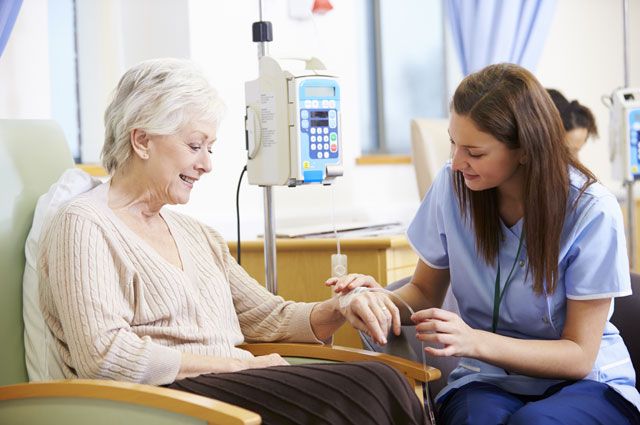
Heredity and stress. What do you need to know to save yourself from cancer? More details
Analysis results
The capabilities of modern immunodiagnostics will allow any of you to find out about the state of your immune system and, if necessary, take the necessary measures in a timely manner.
The results obtained are carefully studied by an allergist-immunologist, who can not only interpret them correctly, but also give qualified recommendations on further tactics for managing the identified disease.
If you need to determine your immune status (take an immunity test), then you can use the services of our clinic. A qualified allergist-immunologist with many years of experience in scientific and practical work will be able to determine the cause of disorders in your body and get rid of the problems that bother you.
Our administrator will inform you in more detail about the service by phone or through the call back form. Contact us, we are ready to answer all your questions!
Ulcer, colitis, etc. diseases of the gastrointestinal tract
Must pass : coprogram.
How often : 1 time every 2 years.
Allows you to identify diseases of the intestines, biliary system, and pancreas.
To diagnose Helicobacter pylori infection, which causes gastritis and stomach ulcers, a urease breath test is used (one of the metabolic products of the Helicobacter pylori bacterium is urease).
Article on the topic
Hormones are acting up. What are the dangers of endocrine diseases and how to detect them?
Complement components
Analysis for complement components is carried out in the diagnosis of many diseases. The main indications for the purpose of the study are:
- suspicion of autoimmune disorders, their diagnosis and monitoring,
- repeated bacteriological diseases,
- systemic lupus erythematosus,
- bacteremia,
- disseminated cytomegalovirus infection,
- polymyalgia rheumatica, etc.
The complement system is a complex of blood proteins. C3 and C4 are complement components by which the current state of the immune system is diagnosed.
C3 is an acute phase protein of inflammation. It is a central component of the complement system and makes up about 70% of all proteins. It is C3 that is the most important part of the body's immune defense against infections. Its activation supports phagocytosis to fight virus cells, increases the permeability of vascular walls, and provokes dynamic contraction of muscle walls.
C4 is a glycoprotein synthesized in the bones and lungs. Like the previous complement component, it supports phagocytosis and promotes faster neutralization of viral cells in the body.
Tests for complement components provide the necessary information about the current state of the body, and also allow you to track the dynamics of treatment. Before collecting biomaterial, you must refrain from physical activity and smoking. Blood for analysis is taken on an empty stomach, 12 hours after the last meal. During the day, their diet should exclude coffee, tea and juice. You can drink clean water. You should consult your doctor about other recommendations for preparing for the test for components of the complement system (about taking medications, etc.)
Endocrine diseases
You must take a blood test for thyroid hormones.
How often : once a year or after severe stress.
An important indicator : the hormone TSH (thyroid-stimulating hormone) is the main regulator of the thyroid gland, which is produced by the pituitary gland.
The norm is 0.4-4.0 mU/l. An elevated blood TSH level may indicate hypothyroidism, a disease of the thyroid gland (insufficient amounts of hormones are produced). A low level of TSH is called thyrotoxicosis and is characterized by an excess of thyroid hormones in the body, which can lead to disruption of the nervous system, as well as disrupt the functioning of cells responsible for the correct rhythm of the heart.
Article on the topic
In facts and figures: there are at least 6 viruses that cause hepatitis
When is an immunogram prescribed?
In modern medicine, there are a number of indications for conducting immunological blood tests, most of which boil down to the patient’s exposure to various viruses and infectious diseases, including those of the reproductive system.
The test is often prescribed to patients with the following diseases or suspicion of them:
- Hepatitis
- HIV
- Herpetic infection
- Metabolic diseases
- With the development of cancer
- For gastrointestinal diseases
- Chronic bronchitis, sinusitis
- Sudden weight loss for no particular reason
- Chronic fatigue syndrome
- Before organ transplant operations
- To determine the immunodeficiency conditions of the patient's body
- When treated with medications that affect the immune system
- For allergic diseases that impair the function of the immune system
Immunological blood tests are also
:

